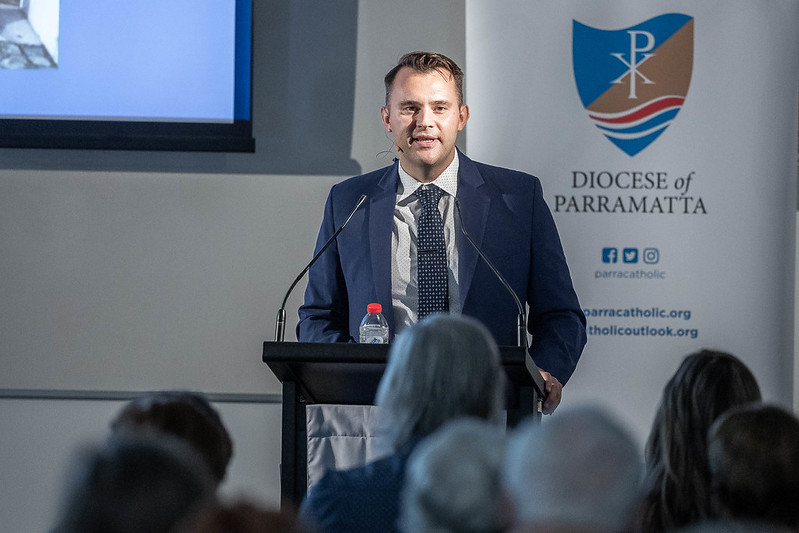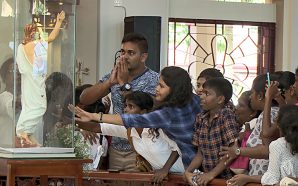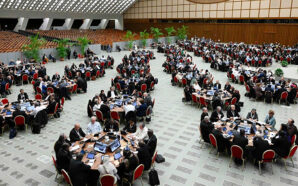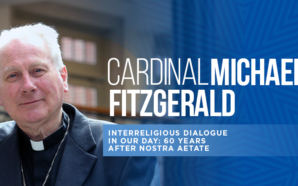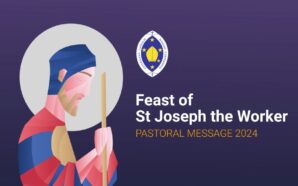“The Synod is no longer an event, it’s a new way of being Church”.
This was one of the crucial thoughts of Vatican correspondent and American journalist Christopher White as he gave his insights and reflections on the recently concluded First Assembly on the Synod on Synodality.
Speaking to members of the faithful across the Diocese of Parramatta and beyond during a public lecture titled, ‘Will our faith have children? Reflections on the health and dynamism of global Catholicism’ on Thursday night, Christopher explored the assembly through the stories of its participants.
The first story he described was that of Swiss theologian Helena Jeppesen-Spuhler. In 2019, she was part of a group of women and men who protested outside of the Synod of Bishops for the Pan-Amazon region calling for ‘Votes for Catholic Women’. During this Synod, women representing religious congregations were invited, but not given a right to vote, even though a religious brother was given special dispensation to vote.
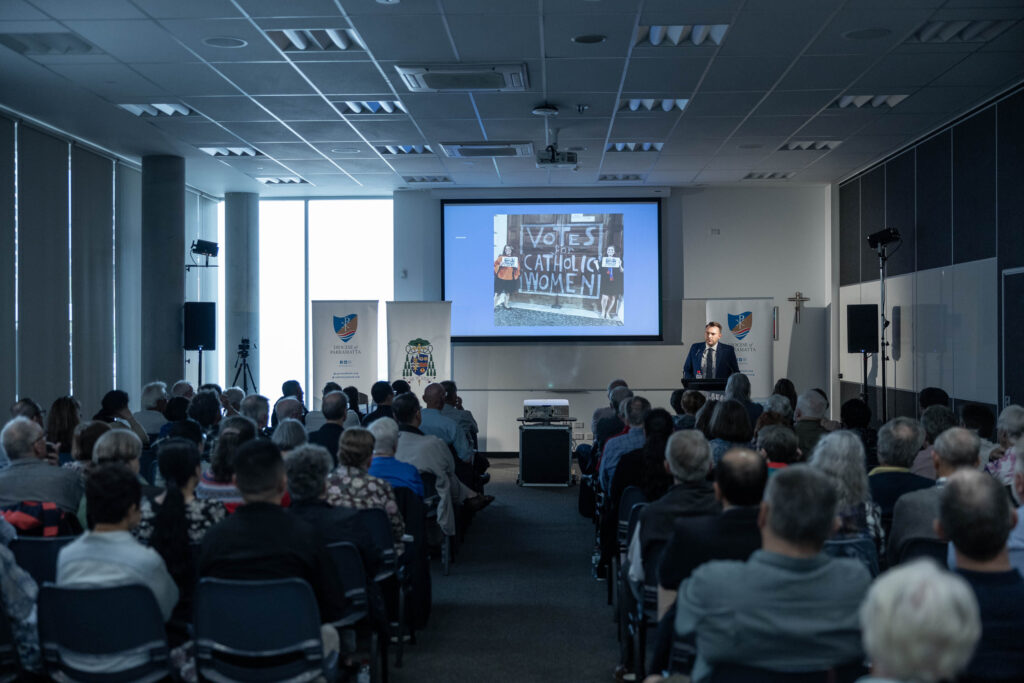
Vatican correspondent and American journalist Christopher White speaks during his public lecture at Our Lady of Mercy College, Parramatta, on Thursday 9 November 2023. Image: Diocese of Parramatta
Helena’s determination saw her get involved in this ‘new’ Synod process at all its stages, and she was invited to become one of the delegates. She was no longer outside the Synod doors, but now inside, participating, and crucially, getting to vote alongside 54 others.
“It’s important that the presence of these new ‘synodal mothers’ as they were called, is a positive development in terms of giving birth to a new type of Catholic Church,” Christopher explained.
Explaining the visit of the Synod delegates on 12 October to the Catacombs of San Sebastian and San Callistus in Rome, Christopher referenced the often-forgotten Pact of the Catacombs that was signed by bishops at the end of the Second Vatican Council in 1965.
“The Pact committed to take the many aims of the Council and live it in their own lives and ministries. These bishops committed to, ‘be faithful to the spirit of Jesus in the service of the poor, to renounce privileges, personal assets and pompousness and to promote justice, charity, collegiality and communion with the people of God’,” Christopher said.
“Regrettably that pact was largely forgotten, at least by those in the West, but in the Global South, it was kept alive by leaders like Dom Hélder Câmara and people like Jorge Mario Bergoglio [Pope Francis].
“The visit of the Synod delegates to the Catacombs, to the very birthplace of the Church, served as a reminder that if the Church is to be reborn, it must recover those early aims and priorities of a Church that is, ‘more humanly present and more welcoming and open to all’.”
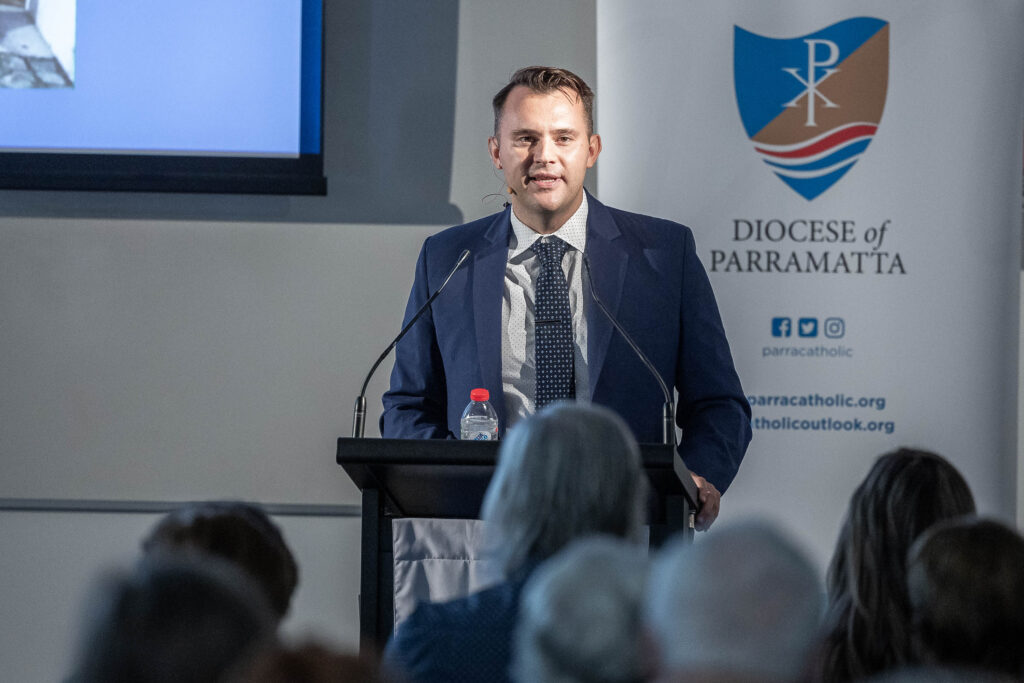
Vatican correspondent and American journalist Christopher White speaks during his public lecture at Our Lady of Mercy College, Parramatta, on Thursday 9 November 2023. Image: Diocese of Parramatta
Another story Christopher told was that of Ghanian lay theologian Nora Kofognotera Nonterah.
“Describing her experience at the Synod,” Christopher said, “Dr Nora said, ‘I feel listened to as a lay person, as a woman and as an African in a Church that most often has not been given a voice – a Church that has not had a chance to enrich itself with voice and wisdom from women, lay people and from Africans. I come to the Synod with the hopes, the dreams, the joys, the anxieties, the lamentations, but also the resilience of African women. Lay people from the continent and, in fact, the entire Church that might not always get to sit at the centre of discourse’.
“My village has long practised synodality. Now, my Church is finally doing so too,” she added.
The final story Christopher shared was from the youngest member of the Synod, 19-year-old Wyatt Olivas from Wyoming, USA.
In an exchange with Pope Francis, Wyatt gave the Pope a small business card with two words on it, “you matter”, which was an initiative the young man had started amongst his friends to remind them of their worth.
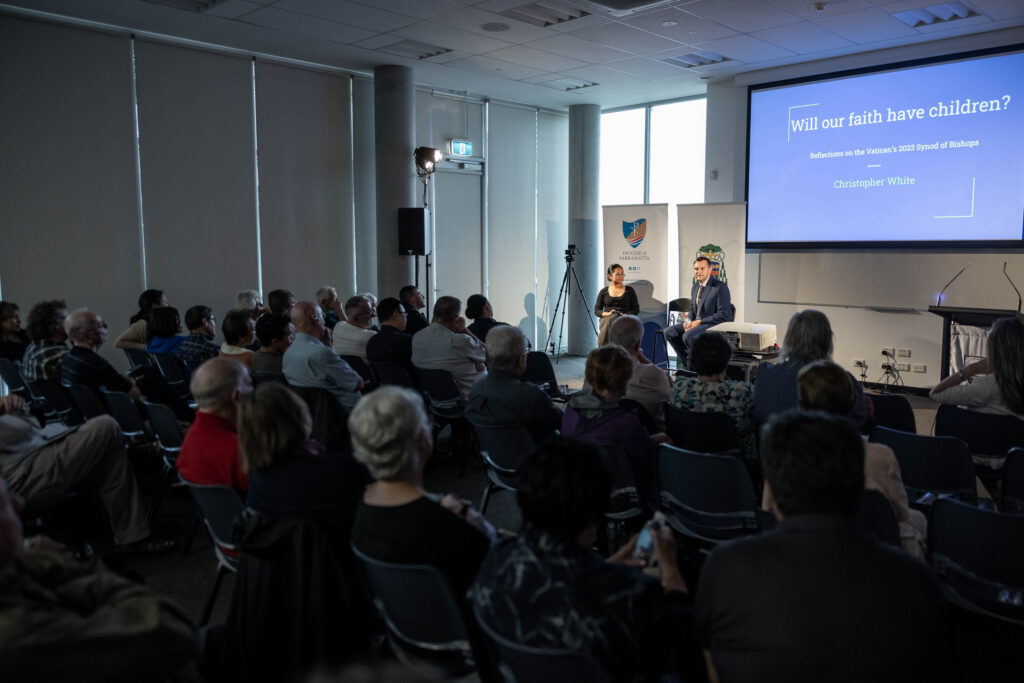
Vatican correspondent and American journalist Christopher White speaks during his public lecture at Our Lady of Mercy College, Parramatta, on Thursday 9 November 2023. Image: Diocese of Parramatta
“Despite his youth, Wyatt was taken seriously by the bishops and cardinals that he had rubbed shoulders with over the past month. ‘I think it’s important that our whole Church take responsibility of our young people seriously. We’re here, we want responsibility’,” Christopher said.
Quoting Archbishop Mark Coleridge of Brisbane, Christopher said synodality under Pope Francis has “shifted from some of the bishops some of the time to all the bishops, and in fact, all the Church all the time.”
“Through synodality, the Pope is trying to contain all of these disagreements [in the Church] so that by the bond of communion, these divergences won’t be papered over, but contained in the Church that makes room for everyone, or as he said during World Youth Day, ‘totus, totus, totus’ – ‘everyone, everyone, everyone’.
“Earlier this year in a message to the Diocese, Bishop Vincent [Long OFM Conv, Bishop of Parramatta] asked, ‘what are the questions stirring in your soul these days? Can we make space to live in them, not needing to have the answers?’ That’s a question for the whole global Church right now.
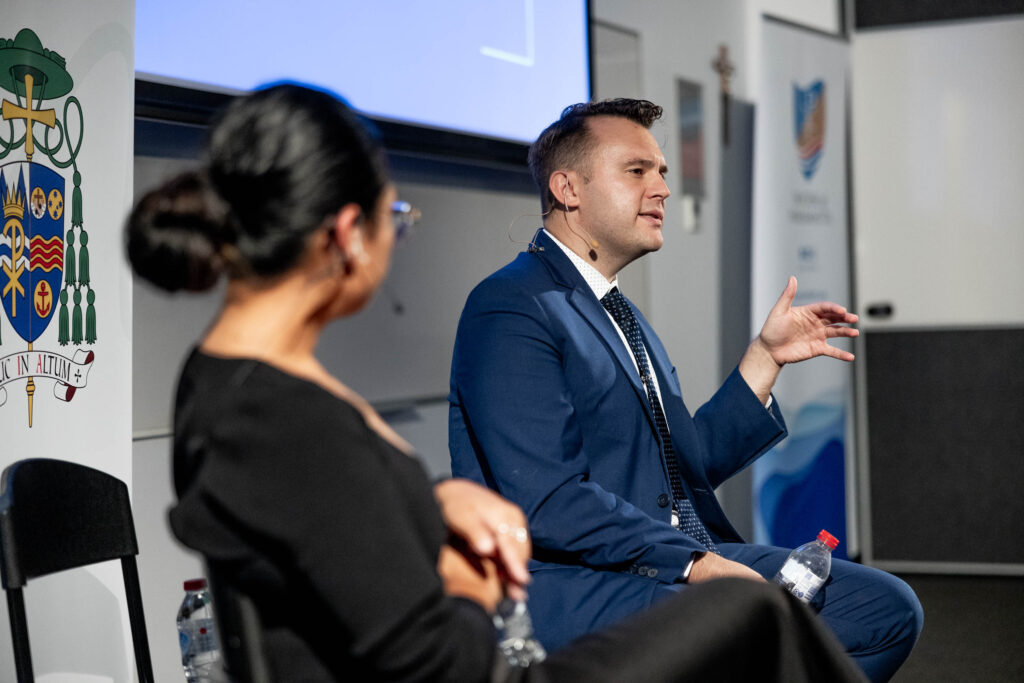
Vatican correspondent and American journalist Christopher White speaks during his public lecture at Our Lady of Mercy College, Parramatta, on Thursday 9 November 2023. Image: Diocese of Parramatta
“During the Final Mass of the Synod, Pope Francis said it was a time for the Church to dream. ‘A Church that is a servant of all, the servant of the least of our brothers and sisters, a Church that never demands an attestation of “good behaviour,” but welcomes, serves, loves and forgives. A Church with open doors that is a haven of mercy.
“For the likes of Wyatt, and so many others, that’s a dream of faith that says to the Church and indeed all of the world that ‘you matter’ and I believe that is a dream of faith that will attract many generations to the Church to come,” Christopher concluded.
You can re-watch Christopher’s lecture via the video above or on the Diocese of Parramatta’s YouTube channel.
View images from the public lecture here or below:




